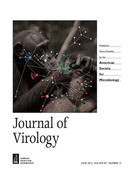- Submit a Protocol
- Receive Our Alerts
- Log in
- /
- Sign up
- My Bio Page
- Edit My Profile
- Change Password
- Log Out
- EN
- EN - English
- CN - 中文
- Protocols
- Articles and Issues
- For Authors
- About
- Become a Reviewer
- EN - English
- CN - 中文
- Home
- Protocols
- Articles and Issues
- For Authors
- About
- Become a Reviewer
Colony Forming Assay for HCV-Replicon Cell Line
Published: Vol 3, Iss 24, Dec 20, 2013 DOI: 10.21769/BioProtoc.1009 Views: 10006
Reviewed by: Anonymous reviewer(s)

Protocol Collections
Comprehensive collections of detailed, peer-reviewed protocols focusing on specific topics
Related protocols

Random Insertional Mutagenesis of a Serotype 2 Dengue Virus Clone
Jeffrey W. Perry and Andrew W. Tai
Aug 20, 2018 6508 Views

CRISPR/Cas Gene Editing of a Large DNA Virus: African Swine Fever Virus
Manuel V. Borca [...] Douglas P. Gladue
Aug 20, 2018 9866 Views

Assembly and Mutagenesis of Human Coronavirus OC43 Genomes in Yeast via Transformation-Associated Recombination
Brett A. Duguay and Craig McCormick
Aug 20, 2025 3038 Views
Abstract
Hepatitis C virus (HCV) is the main causative agent of chronic hepatitis, liver cirrhosis, and hepatocellular carcinoma. Since the HCV genome is present exclusively in RNA form during replication, a number of anti-HCV drugs show appearance of rapid drug-resistant viruses. Therefore, it is important to test generation of drug-escape mutant viruses by developed antiviral drugs for their validity. Here, we describe a colony formation assay-based method to observe appearance of drug-resistant viruses against nucleic acid based anti-HCV drugs in genotype 1b based subgenomic replicon cell culture system (Lee et al., 2013).
Keywords: HEPATITIS C VIRUSMaterials and Reagents
- Cell line: HCV-replicon Huh-7 human hepatoma cell line (HCV genotype 1b subgenomic replicon pFKI389neo/NS3–3’/5.1 containing the neomycin resistant gene, provided by R. Bartenschlager, Heidelberg University, German) (Lohmann et al., 1999; Krieger et al., 2001)
- 0.1% Trypsin-EDTA (WELGENE, catalog number: LS015-01 )
- Fetal Bovine Serum (FBS) (Thermo Fisher Scientific, HycloneTM, catalog number: SH30919.03 )
- 100x Penicillin/Streptomycin solution (Thermo Fisher Scientific, HycloneTM, catalog number: 3V30010 )
- Lipofectamine 2000 (Life Technology, catalog number: 11668-019 )
- NaCl (Sigma-Aldrich, catalog number: S5886 )
- KCl (Sigma-Aldrich, catalog number: P5405 )
- Na2HPO4 (Sigma-Aldrich, catalog number: S3264 )
- KH2PO4 (Sigma-Aldrich, catalog number: P9791 )
- NaOH (Sigma-Aldrich, catalog number: S5881 )
- 1x Phosphate Buffered Saline (PBS) (see Recipes)
- Complete Dulbecco’s modified Eagle medium with high glucose (DMEM) (Thermo Fisher Scientific, HycloneTM, catalog number: SH30243.01 ) (see Recipes)
- 50 mg/ml G418 (Merck KGaA, catalog number: 345810 ) (see Recipes)
- 2% Paraformaldehyde solution (Sigma-Aldrich, catalog number: 158127 ) (see Recipes)
- 1% Methylene blue (Duksan Scientific, catalog number: MEE0-22002 ) (see Recipes)
Equipment
- 35 mm cell culture plate (Corning, catalog number: 430165 )
- 100 mm cell culture plate (BD Bioscience, catalog number: 353003 )
- 5% CO2, 37 °C Incubator (Thermo Fisher Scientific, catalog number: 311 )
Procedure
- Day one: HCV-replicon cells are sub-cultured and are seeded on 35 mm cell culture dish at density of 2 x 105 in 2 ml of complete DMEM.
- Day two: Before transfection, media was replaced with DMEM not containing Penicillin/Streptomycin.
- 4 μM of test or control nucleic acid-based drugs were transfected using Lipofectamine 2000 reagent according to manufacturer's instruction.
- Four hours after transfection, cells were replaced with 2 ml of fresh complete DMEM containing 500 μg/ml G418, and incubated for 2 days.
- Step 2 to step 4 was repeated every 2 day during about two weeks.
- About two weeks later, cells were trypsinized and sub-cultured, and one-tenth of the cells were replated to 35 mm dishes with 2 ml of 500 μg/ml G418 containing complete DMEM.
- Step 2 to step 6 was repeated until visible colonies were obtained (usually, colonies formed one month after first transfection).
- After acquiring colonies, media was removed and cells were washed 1 time with 1ml of 1x PBS.
- Cells were treated with 1 ml of 2% paraformaldehyde for 15 min at room temperature.
- Remove the paraformaldehyde from the cells and add 1 ml of 1% methylene blue for 10 min.
- Remove the methylene blue and wash cells with 1 ml of dH2O three times.
- Cells were air-dried for 15 min, and analyze appearance of drug-resistant cells by counting the number of G418-resistant cell colonies. You can find examples of picture showing drug-resistant colonies in the Figure 4C of Reference 1 (Lee et al., 2013).
Recipes
- 1x PBS
137 mM NaCl
2.7 mM KCl
10 mM Na2HPO4
2 mM KH2PO4
Add dH2O to 1 L and sterilize using autoclave
- Complete DMEM medium (505 ml)
50 ml FBS
5 ml 100x Penicillin/Streptomycin solution
450 ml DMEM
- 50 mg/ml G418
1 g G418 powder
Add dH2O to 20 ml and filter (0.45 μm) for sterilization
Aliquote
Store at -20 °C
- 2% Paraformaldehyde solution (15 ml)
0.3 g paraformaldehyde
75 μl 10 N NaOH
Add to dH20 to 13.5 ml and incubate 60 °C until paraformaldehyde is dissolved
Add 1.5 ml of 10x PBS and store at 4 °C
- 1% methylene blue (15 ml)
0.15 g methylene blue
Add to dH2O to 15 ml
Acknowledgments
This protocol was adapted from Lee et al. (2013). Funding Source included grants from the Korea Healthcare Technology R&D Project by the Korean Ministry for Health, Welfare & Family Affairs (A100399) and National Research Foundation of Korea funded by the Ministry of Education, Science and Technology (2012M3A9B6055200).
References
- Krieger, N., Lohmann, V. and Bartenschlager, R. (2001). Enhancement of hepatitis C virus RNA replication by cell culture-adaptive mutations. J Virol 75(10): 4614-4624.
- Lee, C. H., Lee, Y. J., Kim, J. H., Lim, J. H., Kim, J. H., Han, W., Lee, S. H., Noh, G. J. and Lee, S. W. (2013). Inhibition of hepatitis C virus (HCV) replication by specific RNA aptamers against HCV NS5B RNA replicase. J Virol 87(12): 7064-7074.
- Lohmann, V., Korner, F., Koch, J., Herian, U., Theilmann, L. and Bartenschlager, R. (1999). Replication of subgenomic hepatitis C virus RNAs in a hepatoma cell line. Science 285(5424): 110-113.
Article Information
Copyright
© 2013 The Authors; exclusive licensee Bio-protocol LLC.
How to cite
Lee, C. H. and Lee, S. (2013). Colony Forming Assay for HCV-Replicon Cell Line. Bio-protocol 3(24): e1009. DOI: 10.21769/BioProtoc.1009.
Category
Microbiology > Microbial genetics > Mutagenesis
Microbiology > Microbial cell biology > Cell viability
Do you have any questions about this protocol?
Post your question to gather feedback from the community. We will also invite the authors of this article to respond.
Share
Bluesky
X
Copy link











